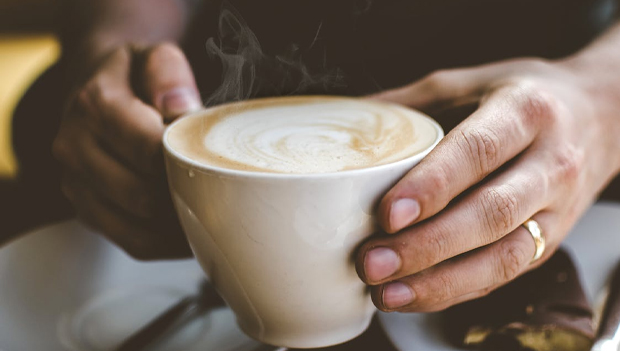
Weight loss isn't just about looking good when summer rolls around, ideal body composition can also be one of the most important things for improving your health and wellness.
For athletes, it can be a great way to reduce pressure on joints and muscles, improving performance and reducing the risk of injury.(1,2) For long-term health, benefits may include prevention of heart disease, reduced risk of hypertension, improved cholesterol, improved sleep, and better blood sugar regulation.(3)
More people than ever are looking for supplements to make this process more efficient and sustainable, which is why there has been so much activity recently around the topic of coffee. Does coffee make you gain weight? Is coffee good for weight loss?
When used correctly, coffee can be a great benefit. Healthy weight loss requires entering a caloric deficit for an extended period of time in a safe, sustainable way that does not put your overall health at risk. Taking in the right amount of water, choosing the best nutrition plan, and incorporating strength and cardio training can all be important contributors.
Pairing supplements with this approach can produce powerful results. Of these options, coffee is one of the best. Ingredients in coffee can aid in things such as appetite control, boosting metabolic rate, and improving performance.(4, 5, 6)
Why Trust Us?
The health and safety of ACTIVE's readers is of the utmost importance to us. To ensure your well-being when consuming dietary supplements, the ACTIVE.com editorial team prioritizes products that are independently tested by a third party. We've also consulted with a team of nutritionists and dieticians to ensure the products we feature are of the highest standard. This helps us create the most accurate, authentic review content for our readers.
By clicking on the product links in this article, we may receive a commission fee at no cost to you, the reader. Sponsorships and affiliate commissions help support our research so we can help you find the best products. Read the full affiliate disclosure here.
Disclaimer: Exercise caution when taking supplements. Always make sure to consult with your doctor before trying a new supplement or pill. Weight-loss supplements are not a substitute for a balanced diet and regular exercise. Any supplements taken should be used in accordance with a healthy lifestyle. Any weight loss more than a pound per week over a long period of time is unusual and should be monitored by a doctor.
Is Coffee Good for Weight Loss?
When paired with a healthy lifestyle, coffee can provide a host of benefits that can cause weight loss. Caffeine in coffee has been shown to boost things like performance, metabolism, and mental clarity, which all help when trying to lose weight.(4,6) It is worth noting that the data suggest that weight loss benefits from caffeine occur at higher doses than in a single cup of coffee. When you're trying to lose weight, you need to be in a caloric deficit. Many people find it harder to focus or concentrate while in a caloric deficit, which is where coffee comes into the picture. Studies show coffee influences mental performance, as caffeine has shown cognitive boosting abilities.(7)
Can Coffee Be Bad for Weight Loss?
Coffee may negatively affect weight loss and your overall health if implemented incorrectly. Most commonly, if caffeine is taken at the wrong dosage or the wrong times. Taking too much caffeine can affect your adrenal system, recovery, and sleep quality, making it harder for you to continue your weight loss journey.(8, 9)
When Should You Drink Coffee to Lose Weight?
Each situation is different. However, we recommend you take your coffee as early in the day as possible and discontinue it earlier in the afternoon. This will give your body the longest amount of time to work it out of your system before bedtime. Consult your doctor for personalized recommendations.
Do Caffeine Supplements Help with Weight Loss?
Many people use caffeine supplements to aid in the weight loss process. When it's paired with a caloric deficit through a healthy diet and exercise, it can help to boost bodily processes that result in more efficient weight loss.
Our favorite coffee alternatives:
FAQs About Coffee for Weight Loss
How much coffee should you drink a day to lose weight?
This depends on factors like age, sensitivity, coffee consumption, and underlying conditions. It's best to consult a doctor to determine the best amount for you.
Does coffee burn fat?
Coffee may aid in several processes, such as increased caloric expenditure during workouts and reduced cravings and hunger affecting caloric intake, which can result in burning body fat.
Which is better for weight loss: coffee or tea?
Both have properties, such as caffeine, that may help with weight loss. Which one will be best for your needs depends largely on your preferences.
These statements have not been evaluated by the Food and Drug Administration. This product is not intended to diagnose, treat, cure, or prevent any disease.
References
- Ackland, T. R., Lohman, T. G., Sundgot-Borgen, J., Maughan, R. J., Meyer, N. L., Stewart, A. D., & Müller, W. (2012). Current status of body composition assessment in sport. Sports medicine, 42(3), 227-249.
- It Comes, W. W. M. W. (2020). to Joint Pain–Harvard Health.
- Pasanisi, F., Contaldo, F., de Simone, G., & Mancini, M. (2001). Benefits of sustained moderate weight loss in obesity. Nutrition, metabolism, and cardiovascular diseases : NMCD, 11(6), 401–406.
- Schubert, M. M., Irwin, C., Seay, R. F., Clarke, H. E., Allegro, D., & Desbrow, B. (2017). Caffeine, coffee, and appetite control: a review. International journal of food sciences and nutrition, 68(8), 901–912. https://doi.org/10.1080/09637486.2017.1320537
- Acheson, K. J., Zahorska-Markiewicz, B., Pittet, P., Anantharaman, K., & Jéquier, E. (1980). Caffeine and coffee: their influence on metabolic rate and substrate utilization in normal weight and obese individuals. The American journal of clinical nutrition, 33(5), 989–997. https://doi.org/10.1093/ajcn/33.5.989
- Martins, G. L., Guilherme, J. P. L. F., Ferreira, L. H. B., de Souza-Junior, T. P., & Lancha, A. H., Jr (2020). Caffeine and Exercise Performance: Possible Directions for Definitive Findings. Frontiers in sports and active living, 2, 574854. https://doi.org/10.3389/fspor.2020.574854
- van Duinen, H., Lorist, M. M., & Zijdewind, I. (2005). The effect of caffeine on cognitive task performance and motor fatigue. Psychopharmacology, 180(3), 539-547.
- Ryu, K. Y., & Roh, J. (2019). The Effects of High Peripubertal Caffeine Exposure on the Adrenal Gland in Immature Male and Female Rats. Nutrients, 11(5), 951. https://doi.org/10.3390/nu11050951
- O'Callaghan, F., Muurlink, O., & Reid, N. (2018). Effects of caffeine on sleep quality and daytime functioning. Risk management and healthcare policy, 11, 263–271. https://doi.org/10.2147/RMHP.S156404
About the Author

David Fang started his career by studying medicine at the State University of New York. Today, he works as a competitive CrossFit athlete, Olympic lifter, and fitness consultant who knows that the key to peak performance starts with rock-solid mental resilience and psychology. David has worked with coaches and athletes from the University of Louisville and Duke University to aid in building a powerful mind-body connection.







Discuss This Article